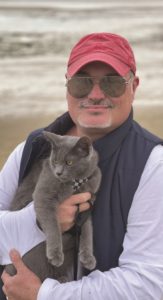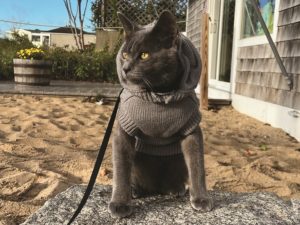“Explain it to me again,” said Richard Bolton, allowing his cat, Grayson, to climb from his lap onto the beach next to the West End parking lot.
“I will interview Grayson,” I explained, “and you will allow his answers to come through you to me.

“It’s for science,” I said. “Or, at least, for the newspaper. It’s very unusual to see a cat walking around Provincetown on a leash, and inquiring minds want to know what that cat is thinking about.”
The 7½-month-old cat sat in the sand with his hoodie slouching stylishly over his face. I asked Grayson to tell me about his day.
“I’ve killed, like, so many birds? Like, so many I can’t even count?” Grayson speaks with an upward rising inflection, as do so many of the younger generation of animals these days, making it difficult to discern whether he’s answering my questions with a statement or another question.
Bolton shook his head and mouthed, “No, he’s never killed anything. Not even a moth.”
Grayson looked up at me with his electric amber eyes framed by thick slate-colored fur. I thought of Steve McQueen draped across the hood of a hot rod, or a young Paul Newman with a cigarette and a pool cue. This cat is cool.
He was adopted from Miami Animal Rescue at the tender age of one month by Bolton and his husband, Roger Walker-Dack, during a winter sojourn in Miami. Those early days were marked by some confusion over whether Grayson was male or female and whether he was of Russian Blue or Korat descent. When I asked him about it, Grayson began backing away.
“Why all the labels, man?” said Grayson. “That’s, like, so uncool.”
It wasn’t until the couple returned to Provincetown that Bolton got the idea to buy a harness and a leash so Grayson could be out and about with them. “The first few times I put him in a harness he would just fall over and refuse to move,” said Bolton. But Grayson quickly adapted to his walks.
“In the mornings, I sit with the humans while they drink their coffee at Café Maria,” said Grayson, describing his daily routine. “I own a big blue chair on the sand. From there I watch the people walking around in my sandbox. I own the whole beach, the ocean, all the fish in it, and everything I see.”
He paused to swat at the empty shell of a horseshoe crab.

“You know about the way-before-times when cats and dogs ruled the earth? Just before the start of Squirrel War One?” Grayson asked. I nodded. “It’s like that now. Every political contest seems like an epic battle between good and evil. But in the end, things always seem to sort themselves out. It’s like I tell my dads: nothing is really the end of the world. Like, we’ve all got nine lives, right?”
Grayson’s words trailed off as something caught his eye. A second later he pounced on a moss-covered rock protruding from the sand, gripping it between his front paws. His eyes darted across the landscape, his agile neck twisting this way and that. Then, abruptly, he released the rock and returned to our conversation.
An unleashed wet Bernese mountain dog came bounding over to Grayson, who seemed nonplussed as Bolton scooped him up. The dog, slobbering, sniffed the air about six inches from Grayson’s nose. Grayson stared silently back at the dog until its human called it away.
“I like big, slow dogs, which is how a dog should be,” said Grayson. “I have a chill Dalmatian friend named Chuckles. We can hang, touch noses. But don’t come at me with your, like, small-dog wiggling and fast movements. That’s, like, so uncool?
“I like the indoors,” said Grayson. “A little catnip, some Britney on the radio, and a nice ride around the living room on the top of a Roomba. It’s all good.
“But I feel for, like, all the cats out there that, like, never get the chance to get their paws in the surf? Outdoors with my dads, surveying all the stuff that I own, and plotting the end of all birds — that’s the life, man.”



